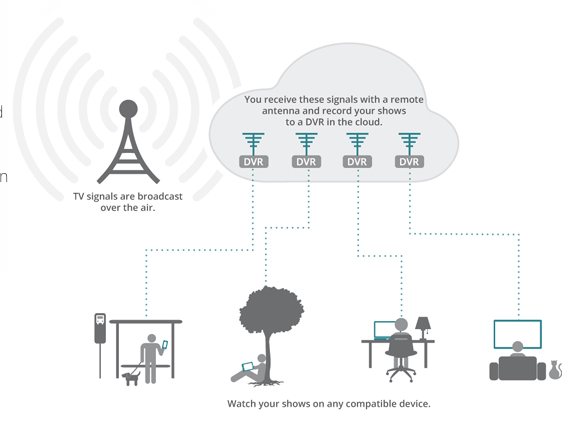Cablevision: Broadcasters’ Attack On Aereo Doing More Damage Than Good

A diagram of how Aereo works. Cablevision argues that broadcasters’ appeal to the Supreme Court could undermine all cloud-based technology.
In the Cablevision white paper, the company agrees with the broadcasters’ basic stance that Aereo violates the networks’ copyright by retransmitting the feeds without approval or paying retransmission fees. However, Cablevision takes issue with the way in which the broadcasters are making their case.
In shooting down the broadcasters’ request for an injunction against Aereo, the Second Circuit held that because Aereo’s system uses arrays of small antennae, with each antenna dedicated to a single subscriber, the company was not “publicly performing” the streamed shows, i.e., that it was doing nothing more than providing the same service that a dedicated rooftop antenna does.
Cablevision does not agree with the court’s finding, but says the broadcasters’ appeal to the U.S. Supreme Court “advance a radical new interpretation of the statute with far-reaching implications.”
From the white paper:
They claim that a public performance occurs whenever a service provider enables consumers to transmit the same prior performance of a work, such as the same prior broadcast of a television show or the same prior rendition of a musical work, even if each consumer is independently transmitting a separate performance from his own separately acquired recording available to him alone. That interpretation threatens cloud technologies. It lacks any grounding in the Copyright Act.
Cablevision gives the example of two consumers who each independently purchase the same recording from Amazon’s MP3 Store and then upload the song to his/her own personal storage space on Amazon’s Cloud Player, from which they can stream the files back to themselves at will. Under the broadcasters’ argument, Amazon would be engaging in a public performance each and every time a cloud-stored song is streamed.
“That interpretation threatens a whole host of innovative cloud-based services offered by companies such as Google, Amazon, and Apple,” writes Cablevision, whose own cloud-based DVR system would be imperiled.
The company accuses the broadcasters of throwing the baby out with the bath water by making such an overreaching argument. Cablevision maintains that the broadcasters need not possibly undermine all cloud-based technology just to make its case against Aereo.
“Aereo’s system performs the same basic function as a cable system: It captures over-the-air broadcast content and offers to retransmit that content to anyone
willing to pay,” writes the company. “Thousands of mini-antennas and hard-drive copies do not change the essential nature of the service Aereo is offering.”
Cablevision also questions the legality of Aereo’s DVR technology.
“Subscribers have no fair use right to make copies merely so they can receive programming over an unlicensed television delivery service,” contends the paper. “A court should hold Aereo’s system unlawful on that basis without even reaching the public performance issue.”
Whether or not the Supremes listen to the Aereo case in the next session or not, the matter does seem destined to be ruled on by the highest court in the land at some point.
Meanwhile, various cable companies are prepping their own Aereo-like services in the hopes that the broadcasters’ legal attempts fall short, as such technology could be a way to get around paying billions in retransmission fees to networks.
Problem is, those networks each belong to much larger entertainment companies that provide cable channels and on-demand shows and movies to the cable and satellite operators. If the over-the-air retransmission fees vanish, these mega-companies will no doubt just negotiate higher prices for the rest of their content to make up for it.
Want more consumer news? Visit our parent organization, Consumer Reports, for the latest on scams, recalls, and other consumer issues.

